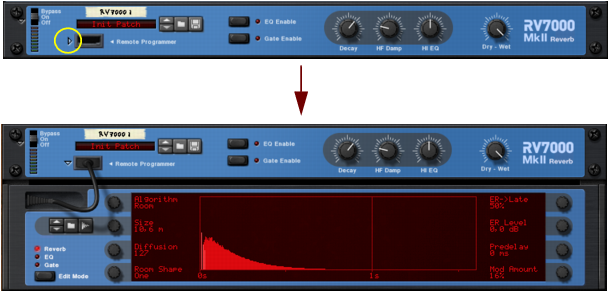The RV7000 Mk II is a high quality reverb processor. It features ten different reverb and echo algorithms, ranging from rooms and halls to special effects. The Mk II version also incorporates a high-quality zero-latency convolution algorithm, which makes it possible to load sampled impulse responses - and even sample and use your own impulse responses!
Since the RV7000 Mk II comes with a number of useful reverb presets, you could simply select one and tweak the most important parameters on the main panel - or you could use the Remote Programmer panel to fine-tune the reverb in great detail.
The RV7000 Mk II also contains an equalizer and a gate section. Both of these are for processing the actual reverb sound, making it possible to get virtually any kind of reverb character, including gated reverb.
The RV7000 Mk II features programmable effect presets. In the Factory Sound Bank you will find a number of preset Patches which can be used as they are or provide you with a good starting point for further tweaking.
Patches use the Windows file extension “*.RV7”. Loading and saving Patches is done in the same way as for instrument devices.
|
|
Songs and/or Patches that use Convolution (or have an Impulse Response sample loaded) can not be opened in older Reason Essentials versions. The same goes for Combi Effect patches that contain RV7000 Mk II in Convolution mode (or with a sample loaded, or with the Combi programmer referencing Convolution parameters).
|
|
|
Convolution patches that use samples only contain references to the samples - not the sample itself. This is the way all sampler devices in Reason Essentials work.
|
Typically you connect the RV7000 Mk II as a send effect, as this allows you to use it for processing several different mixer channels. However, it’s also possible to use it as an insert effect - use the Dry/Wet control on the main panel to adjust the balance between the dry, unprocessed sound and the reverb. Note:
|
|
The RV7000 Mk II is a true stereo reverb (except in Convolution mode), which means that it will use the stereo input information when processing both channels (without summing the input channels).
|
It’s also possible to use it as a mono in - stereo out effect. Which type of connection to use (mono or stereo in) depends on the material. If the audio sources are in mono (or in stereo but with no important difference between the left and right channel) using a mono input is sufficient.
|
|
If you want to use RV7000 Mk II’s Reverse reverb effect, you should consider connecting it as an insert effect or using a Send on the Mixer, with Pre-fader mode selected (and the channel fader lowered).
|
This is because you typically don’t want to hear the dry sound when using the Reverse effect. See “The Gate section”.
When you create an RV7000 Mk II, only the main panel will be shown. This contains a section for handling patches, on/off buttons for the EQ and Gate sections, the most important reverb parameters and a dry/wet mix control. To select a reverb patch and make coarse adjustments, this is all you need.
|
•
|
|
•
|
Settings are made with the eight dials around the graphic display. The functions of the dials differ depending on the selected Edit Mode and the selected reverb algorithm. Next to each dial, the display shows the name and value of the corresponding parameter.
|
|
•
|



